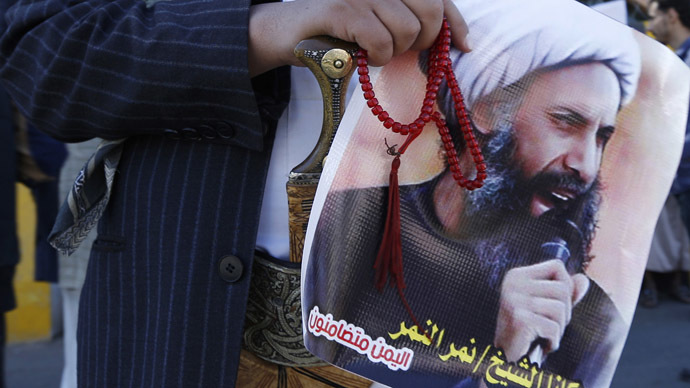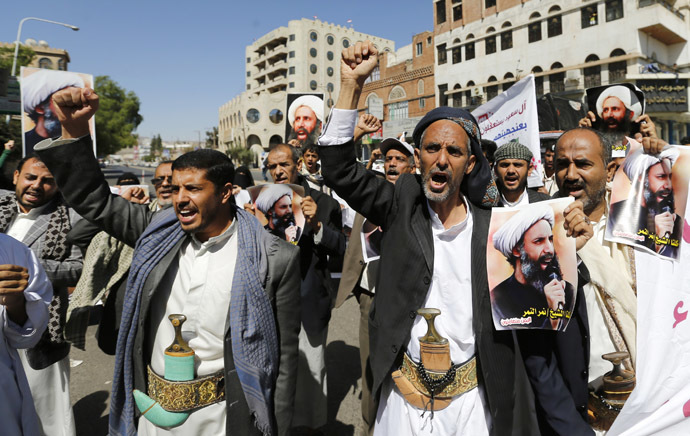Saudi Arabia is shooting itself in the foot by executing Shiite cleric

The House of Saud’s plans to execute a revered Shiite cleric and protest leader reveal the extent to which the regime is vulnerable and desperate to perpetuate itself. Going ahead with the execution would be strategic miscalculation.
Significant political developments have unfolded in Saudi Arabia in recent weeks following a court decision to execute Sheikh Nimr Baqir al-Nimr, a polarizing Shiite cleric and political activist who has campaigned for civil equality, an inclusive socio-political system, women’s rights, minority rights, and the release of political prisoners. Prosecutors condemned the cleric to death by beheading as punishment for charges of sedition, though the execution date has not yet been set.
Sheikh Nimr has been the fiercest critic of the Kingdom’s absolute Sunni monarchy for the last decade, but gained a considerable public following after leading a series of protests in 2011 in opposition to the Saudi military’s violent intervention and suppression of the pro-democracy movement in neighboring Bahrain, a satellite state with a Shiite majority ruled by a heavy-handed Sunni dynasty. His sermons and political activism continually emphasized non-violent resistance.
The Kingdom’s decision to sentence Nimr to death has complex implications that will push sectarian tensions to fever pitch inside Saudi Arabia and throughout the region, dangerously sharpening tension with Iran. Prominent clerics in Iran and Bahrain, as well as Shiite militant groups such as Hezbollah of Lebanon and the Houthi movement of Yemen, have all condemned the verdict and warned the Kingdom not to proceed with the execution.
These developments are a symptom of the greater Sunni-Shiite sectarian conflict raging throughout Iraq, Syria and other hotspots across the region, representing the most poignant challenge facing the Muslim world in contemporary times. Western governments and corporations have aided and abetted Saudi Arabia and other wildly repressive theocratic monarchies, which have been given carte blanche to shape and spread radical Sunni Islam. The United States has long tolerated the House of Saud exporting fanatic sectarianism throughout the Islamic world in the interest of furthering its own strategic foreign policy objectives.
Saudi Arabia, a key financier of jihadist groups fighting in Syria and Iraq, has used its vast oil wealth to promote the ideology of ultra-conservative Wahhabism in missionaries throughout the Muslim world over the past three decades. It has sought to promote a puritanical and rigidly exclusionist Islam that declares non-Muslims – and Muslims of minority sects – as infidels. The Kingdom is governed by a feudalistic, decadent monarchy bent on entrenching its own power and the uncontested legitimacy of the King as the de facto leader of Sunni Islam.
The rise of the Islamic State organization is the result of reckless Western and Gulf policies that have destabilized both Iraq and Syria. Because this group and their fellow travelers do not recognize the legitimacy of the House of Saud, the Kingdom has constructed a massive fence around its borders, in addition to taking measures to prevent domestic sympathizers from becoming politically active inside the country. Saudi Arabia has recently agreed to an American request that the Kingdom provide a base to train so-called “moderate” Syrian rebel fighters, in the name of fighting extremism.

The execution of Sheikh Nimr, a revered Shiite religious scholar, will be widely read by fanatic Sunni militia groups as a Saudi endorsement of their campaign of sectarian cleansing and bloodletting of Shiites and minorities in Iraq and Syria, in the interest of crushing any political opposition to radical Wahhabism. The notion that a country so demonstrably sectarian and extremist can be entrusted with the task of training “moderates” is appalling.
The House of Saud has promoted the unsubstantiated narrative that Iran is actively plotting to undermine Sunni Islam, characterizing the country’s Shiite minority as co-conspirators. The two million strong Shiite minorities – who represent some 10 to 15 percent of the population – live in the oil-rich eastern province that is strategically vital to the Saudi economy. This blatant manipulation of the sectarianism is aimed at dividing the citizens of Saudi Arabia from forming a unified opposition to the monarchy.
Sheikh Nimr was shot four times by police and arrested in February 2012, fueling protests throughout the eastern province, mainly in Qatif and Awamiyah, but also wider unrest in Sunni areas such as Hejaz, Mecca, and the capital, Riyadh. Open dissent is rare in the Kingdom, but it is becoming increasingly common with the rise of the internet. More than half the country is under 18-years-old, while the heirs to the throne are rapidly ageing.
Open-minded sections of society are beginning to come to the realization that Saudi Arabia is a brutally theocratic, opulent gerontocracy utterly dependent on energy exports and Western patronage. The rise of the Islamic State group, whose leadership claims to represent all Muslims, has created a situation where Riyadh must demonstrate its Islamic credentials through its uncompromising implementation of Sharia law, which has led to a recent surge of executions by beheading.
Riyadh’s calculation is that executing Sheikh Nimr will help increase support for the monarchy from a society with strong anti-Shiite leanings. It will also polarize the Shiite minority and young cosmopolitan Sunnis, leading to wider unrest and more open displays of dissent against the monarchy. In death, the Saudis would immortalize Sheikh Nimr as a symbol of opposition, thereby shooting themselves in the foot. It would be a major strategic blunder for the House of Saud to give its opponents a martyr.
The Saudi ruling family feels increasingly vulnerable from both internal and external threats, and the pervasive stoking of sectarian tension and anti-Shiite sentiment are an attempt to deflect from other potential forms of dissent, such as the lack of political representation and the dire poverty that many in the Kingdom live under. Sheikh Nimr’s call for compassion, social justice and civil equality undeniably claim the moral high ground. The only move Riyadh can make to delegitimize this message is to fuel irrational, unthinking sectarianism.
In any case, the silence from Washington has been deafening. The US has not given any sign that it is opposed to Sheikh Nimr’s execution and would not be inclined to take the side of a Shiite cleric that Riyadh accuses of being an agent of Tehran. Washington’s missionary democracy promotion is left at the door when dealing with Saudi Arabia, which is far too strategic and beneficial to US military and economic interests to be cut loose as a liability. Sheikh Nimr’s only fault is opposing the wrong regime in the wrong country. If he campaigned with the same program against a government that the West regarded with hostility, the world would know his name.
The statements, views and opinions expressed in this column are solely those of the author and do not necessarily represent those of RT.
The statements, views and opinions expressed in this column are solely those of the author and do not necessarily represent those of RT.












